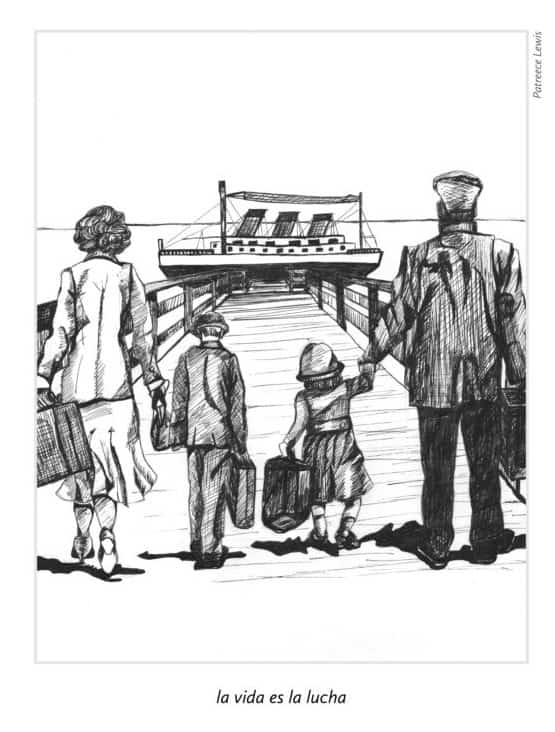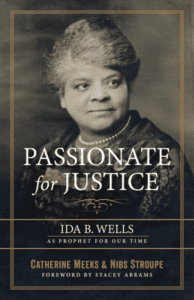
Better the little that the righteous have than the wealth of many wicked;
for the power of the wicked will be broken, but the Lord upholds the righteous.
Psalm 37:16–17
“It must have been so difficult to leave her life, her friends, her family and have only one suitcase to take with her,” I remarked to my abuela as we talked about her sister, Raquel, who had recently defected from Cuba to the United States while on a government trip.
With tenderness and conviction, she responded, “Lisa, asi fue como salimos todos, con una sola maleta en nuestras manos” (Lisa, that’s how we all left, with just one suitcase in our hands). I was stunned to think about the enormous sacrifice it was for my grandparents to flee with their three young boys, one a mere infant, to begin a new life in the United States.
After months of requests to the government and consistent denials for visas for the entire family, my grandfather was finally granted five visas on Christmas Eve 1961. “Here are your family’s visas. Pack your things; you leave tomorrow” were the astounding words of the Cuban official.
Imagine uprooting your entire life and leaving your home in one day. Imagine saying goodbye to your parents, sisters, brothers, friends, and neighbors all in one afternoon, not knowing, because of a war and economic factors, when or if you will ever see them again. Imagine selecting clothes for yourself, your husband, and your kids that will be sufficient for the life that awaits you on a new shore, and yet modest enough to fit in your suitcases. Imagine your conversations with God throughout that day as you say goodbye. Imagine your salty, bittersweet tears and deepest heart groans of joy and lament making their way heavenward to the God who sees and knows you.
Abuelita’s perspective
I wonder if it was the “one suitcase” reality that gave my family the perspective they shared with me in my growing-up years. Occasionally, my abuela would fold up a 20-dollar bill and press it into my hand as I was leaving her house after a visit. Curious about why she was giving me money and not keeping it for herself, I would ask her about it. She would respond with a simple and frank, “Para que lo necesito yo? Dios me ha dado todo de lo que necesito” (What do I need it for? God has given me what I need). Despite never amassing any wealth, she seemed free of the clutches of greed and material affluence. Through her generosity, she quietly lived in prophetic opposition to the machinations of excess that are so prevalent here in the United States.
La vida es la lucha
Perhaps she understood the first verse of the passage from Psalm 37 quoted above: “Better the little that the righteous have than the wealth of many wicked.” In a world that screams, “Get as much as you can at any cost,” rings the clarion call of truth that reorients us to real abundance and the justice of God. The pursuit of material gain is rarely regarded positively in Scripture. Instead, Scripture calls us to an abundance of virtues like generosity, humility, faith, and righteousness. In the eyes of the world, these merits matter less. In God’s economy, however, they are the assets most prized. They are the ingredients that make for a beautiful life. Of all the things to treasure, these gems are what we pack into our “one suitcase” of life.
Jesus echoes and clarifies this upside-down economy of God in the Beatitudes. “Blessed are you who are poor, for yours is the kingdom of God” (Luke 6:20). Those who have little, the broke and broken down, are the ones who gain an inheritance beyond worth, measure, and imagination. Though their earthly possessions may fit into just one suitcase, their heavenly Father bestows on them blessing and the abundance of the kingdom. By contrast, consider how the rich young ruler walked away sad from Jesus, because he could not comprehend surrendering his material possessions to receive the spiritual rewards that a life with Jesus offers.
The exhortation is also an invitation. The psalmist and Jesus invite us into a way of living that sees our sufficiency in Christ. They beckon us into a life that is full, not with the stuff of earth but with the stuff of the kingdom, where love, joy, peace, patience, kindness, gentleness, and self-control are the hallmarks. The psalmist and Jesus call us to intertwine our lives with the lives of those experiencing poverty—those marginalized and ground down by the world’s powerful and prosperous—for it is in proximity to and in relationship with the poor that we might learn something rich about our Lord.
I am my abuela’s granddaughter, and I am a daughter of the values in this country that my family now calls home. The tide of American dreaming has made its way into my life, and I find myself interrogating my situation. I have more than I can fit into hundreds of suitcases. I own a home. Without intention, I can isolate myself from those in my city who are struggling economically and are being oppressed by economic and justice systems. I need to continually return to the words of Jesus, to the words of Scripture, to my abuela’s words, lest I drift into the toxic stream that seduces me into thinking that satisfaction is determined by comforts and security is found by the way of wealth.
 Mi familia’s legacy
Mi familia’s legacy
I am proud to belong to the Rodriguez family, one whose heart beats for the righteousness and justice of God’s kingdom. I am proud to be the daughter of an immigrant whose prayers, hard work, and persistence have made an indelible mark on me. That deep pride of being both a Jesus follower and a descendant of an immigrant family fuels a profound lament for the ways our country disregards and oppresses its immigrants. What’s more lamentable still is the white evangelical church’s complicity and acquiescence in this oppression. The Scriptures are clear that God has a unique concern for the widow, the orphan, the poor, and the immigrant. Any attempt to disparage or neglect the image of God in immigrants, as in all humanity, is, as the psalmist writes, “wickedness.”
The psalmist is clear in these verses that God upholds the righteous and that the power of the wicked will be broken. In my lament, I am met with the comfort and truth of God’s faithfulness as a sustainer of his people. Likewise, my lament is eased when I am reminded of God’s power to destroy the wicked. It is not mine to determine the timing or manner of God enacting this justice, but I hold hope and faith together in our God, who will accomplish justice in the earth.
Because of the beautiful faith and legacy of mi familia, I have come to understand and aim for the beauty of a life lived from “one suitcase.” May we be found faithful pursuing the upside-down kingdom, where less is more and righteousness is of great gain over the wealth of the wicked.
Dear Jesus, we lament the brokenness of this world that forces families to flee their homes and their lands. We lament the ways immigrants are often treated in our communities. We pray for your justice. Give us eyes to see you among the poor and to see our own depravity when we pursue worldly gain at any cost. Grant that we would value simplicity with righteousness over abundance with wickedness. We pray this for the sake of your kingdom and in your name. Amen.
 Lisa Rodriguez-Watson is the national director of Missio Alliance. She also serves as the associate pastor of discipleship and equipping at Christ City Church. A proud Cuban American, Lisa is an activist for immigration reform. She is a writer and conference speaker. Lisa lives in Washington, DC, with her husband and three kids.
Lisa Rodriguez-Watson is the national director of Missio Alliance. She also serves as the associate pastor of discipleship and equipping at Christ City Church. A proud Cuban American, Lisa is an activist for immigration reform. She is a writer and conference speaker. Lisa lives in Washington, DC, with her husband and three kids.
Excerpt from Voices of Lament by Natasha Sistrunk Robinson, published by Revell, a division of Baker Publishing Group. Used by permission.


